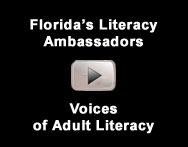


   |
|
|
| Promising Practices Literacy Training Design and Presentations Many resources are available to help organizations plan and implement tutor training programs. Some of the most widely utilized and respected systems are outlined below. Please look through the Training Links to explore related resources, studies and supporting materials. Laubach Literacy’s Training By Design, published by New Readers Press (NRP), provides in-depth information on planning literacy and ESL workshops and on developing workshop presentations. Videotapes and resource books are available. |
| NRP also offers free workshop presentations that you can download. Visit NRP, the publishing arm of ProLiteracy Worldwide, and click on Staff Development and Training. Based on the principles of Literacy Volunteers of America, the LVA Guide for Training Trainers models a collaborative relationship between tutors and students. Training Trainers provides trainer notes, learning task instructions and materials for tutor trainer workshops. The LVA Guide is also available through NRP. For information on creating online training or teaching resources for your trainers, tutors or learners, consult The Learning Resources Network (www.lern.org). Topics include designing online instruction, building learning communities in cyberspace and creating streaming audio lectures. The Florida-based Volunteers and Literacy Committee Practitioner’s Task Force on Restructuring and Accountability published A Manual for Volunteer Literacy Programs, Volume II, which is available through the Palm Beach County Literacy Coalition. Pages 14 to 19 are dedicated to improving and enhancing tutor training workshops. Click here for the manual. Impacts of a National Merger With the merger of Laubach Literacy Action and Literacy Volunteers of America, many organizations are examining their training programs and questioning whether and/or how to best marry the training principles and practices of the two organizations. In the next section, ProLiteracy America’s training coordinator provides answers to some of the most frequently asked questions from the field. Following FAQs is a Comparison of LLA and LVA tutor and trainer workshops. Frequently Asked Questions Regarding LLA and LVA Training What tutor training materials should we be using? And, when will new training materials be available? “ProLiteracy America recommends high-quality and comprehensive tutor training. We value local decision-making and support local organizations in planning for, conducting, and evaluating their own training. As a result, the tutor training of many local ProLiteracy America affiliates combines the best of several tutor training resources. ProLiteracy America will continue to support and make available the tutor training and tutor resources from both predecessor organizations until ProLiteracy America has the opportunity to develop new materials. Affiliates are not required to use any materials-current or new-produced by ProLiteracy Worldwide.” Our program is not able to access some kinds of training locally. What are ProLiteracy America’s plans for online training?
In the past, LLA-certified trainers and LLA members sent lists of their workshop participants to the national office. Each participant received a free individual Laubach membership. Will ProLiteracy still provide this service? “Yes. ProLiteracy America will provide a free six-month affiliation to any individual who completes a tutor workshop that is led by a certified ProLiteracy America trainer or sponsored by a ProLiteracy America affiliate. This option is also available to former LVA trainers who want their new tutors to receive a free individual affiliation in ProLiteracy America. To register your new tutors go to the trainer certification section of the ProLiteracy America website.” Certification as a ProLiteracy America trainer requires attendance at a train-the-trainer workshop. Both the Training of Trainers (LVA) and the Trainer Workshop: Basic Training Skills (LLA) are acceptable. What are the similarities and differences? “Both workshops cover similar content: Lewin's Model - The LLA workshop covers the model explicitly
with background on Lewin and the model itself. Trainers practice
the model. LVA training breaks the cycle down and examines the
individual concepts, e.g., praxis (practice/reflection), drawing
on trainee experience, sequence and reinforcement, and so on. The differences include the following: Some general impressions from trainers who have participated
in both workshops follow: For information on how the merger impacts trainer certification, please visit Training the Trainer. For further information, please contact Kaye Beall, ProLiteracy America’s Training Coordinator. Comparison of LLA and LVA Tutor Training
ESL Training Design and Presentations The training systems mentioned above also provide ESL components, and numerous organizations – many of them listed under Training Links – offer additional resources. The University of Tennessee Center for Literacy Studies offers a 26-minute video presentation “ESOL Teacher Training.” The Florida-based Volunteers and Literacy Committee Practitioner’s
Task
Force on Restructuring and Accountability published A Manual
for Volunteer Literacy Programs, Volume II, which is available
through the Palm Beach County Literacy Coalition. Pages 17 to
19 are dedicated to improving and enhancing tutor training workshops.
Click
here
for the manual. |
 |
 |
 |
 |
 |
 |
 |
|
.Florida Literacy Coalition Florida Literacy Hotline |